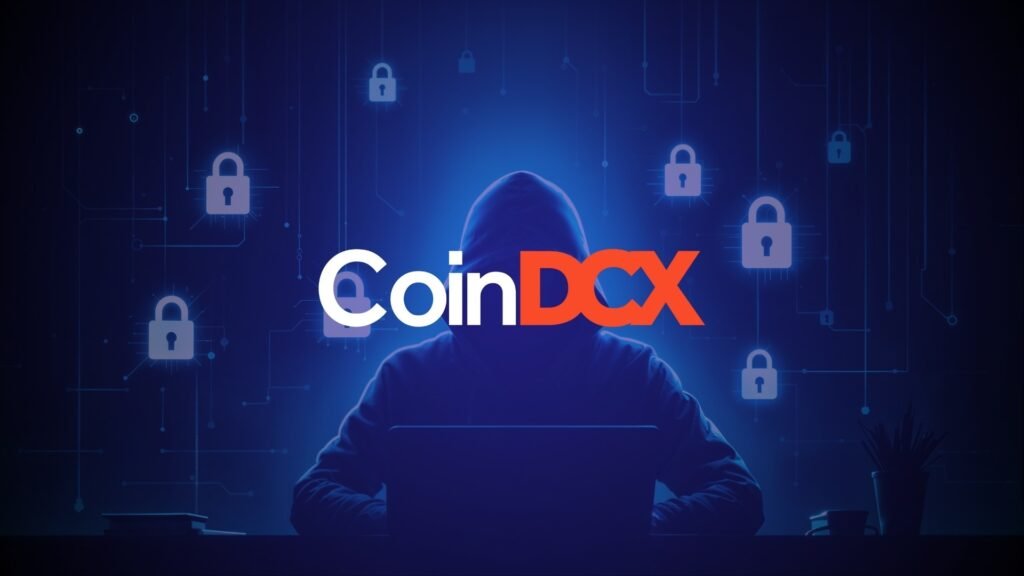CoinDCX stands as one of India’s most prominent cryptocurrency exchanges, boasting over 1.91 crore users and offering a diverse suite of trading options, including spot trading, futures, and margin trading. Established in 2018, it has earned a reputation for its user-friendly interface and extensive range of supported cryptocurrencies. However, a significant security breach in July 2025, where hackers stole $44.2 million, has raised questions about its safety. This article provides an in-depth analysis of CoinDCX’s security measures, the details of the recent hack, user feedback, and an overall assessment of whether CoinDCX is a safe platform for crypto investors.
Security Measures at CoinDCX
CoinDCX has implemented a robust set of security protocols to safeguard user funds and data, positioning itself as a leader in the Indian crypto market. Below are the key security features:
- Financial Intelligence Unit (FIU) Compliance: CoinDCX is registered with India’s FIU, adhering to strict anti-money laundering (AML) and counter-terrorism financing (CTF) guidelines. This regulatory oversight ensures that the platform operates within legal frameworks, enhancing user trust.
- ISO/IEC 27001:2022 Certification: This internationally recognized certification demonstrates that CoinDCX maintains a comprehensive information security management system, protecting user data and assets from cyber threats.
- Proof of Reserve (PoR) Reports: CoinDCX regularly publishes PoR reports, which verify that the exchange holds sufficient reserves to cover all user deposits. For instance, their January 2025 Transparency Report noted reserves 1.48% higher than customer holdings, reinforcing financial integrity.
- Crypto Investor Protection Fund (CIPF): With a fund of ₹57.5 Cr, CoinDCX has established a safety net to compensate users in case of unforeseen security incidents, providing an additional layer of protection.
- Advanced Security Protocols: The platform employs multi-signature wallets, geographically distributed cold storage (where 95% of funds are stored), and regular stress testing to detect vulnerabilities. Two-factor authentication (2FA) is available to users, adding an extra layer of account security.
- Anti-Phishing Measures: CoinDCX actively warns users about phishing scams and impersonation tactics, urging them to interact only with verified handles and platforms. The Delhi High Court recently awarded an injunction against unauthorized use of CoinDCX’s name and logo, further protecting users from fraud.
These measures collectively suggest that CoinDCX prioritizes security and transparency, aligning with industry best practices to protect its users.
The July 2025 Hack: What Happened?
On July 19, 2025, CoinDCX suffered a significant security breach, resulting in the theft of approximately $44.2 million in USDC and USDT from an internal operational wallet on the Solana blockchain. The incident was caused by a sophisticated server breach, where attackers gained unauthorized access to the wallet used for liquidity provisioning on a partner exchange. Crucially, user funds were not affected, as they are stored in segregated cold wallets, separate from operational accounts.

Details of the Incident
- Nature of the Breach: The hack targeted CoinDCX’s backend infrastructure, specifically an operational wallet, rather than user accounts. Investigations revealed that a software engineer, Rahul Agarwal, was tricked into installing malware via a fake job offer, which allowed hackers to access his office-issued laptop credentials.
- Financial Impact: The stolen amount, valued at $44.2 million, was absorbed entirely by CoinDCX from its treasury reserves, ensuring no financial loss to users.
- Response and Transparency: CoinDCX responded swiftly by isolating the affected account and maintaining full platform functionality, including trading, deposits, and withdrawals. They issued a detailed incident report on July 20, 2025, and held a live session on July 21 to address user concerns. The exchange also launched a white hat bounty program, offering up to 25% of recovered funds to ethical hackers who assist in retrieving the stolen assets.
- Ongoing Investigation: CoinDCX is collaborating with global cybersecurity experts, forensic agencies, and law enforcement to track the stolen funds, which were laundered across chains, including Solana and Ethereum, via Tornado Cash.
Implications
While the hack exposed vulnerabilities in CoinDCX’s internal systems, the fact that user funds remained untouched and the exchange’s transparent response are positive indicators. The arrest of the involved employee and the bounty program further demonstrate CoinDCX’s commitment to addressing the issue and preventing future incidents.
Legal Compliance: Is CoinDCX Regulated?
One of the strongest indicators of a crypto exchange’s legitimacy and safety is its alignment with local regulations. CoinDCX operates under the Indian legal framework and complies with Know Your Customer (KYC) and Anti-Money Laundering (AML) norms. The platform requires every user to complete full identity verification before accessing fiat deposits, withdrawals, or trading features.
Furthermore, CoinDCX was among the first Indian crypto exchanges to implement Travel Rule compliance in line with FATF guidelines, showing its commitment to lawful crypto transactions and global best practices.
Proof of Reserves (PoR): Transparency in Asset Management
In the wake of industry collapses like FTX, the crypto community now demands Proof of Reserves (PoR) from all exchanges. CoinDCX responded proactively by launching a PoR Dashboard, which publicly shares wallet balances and third-party attestations of reserves. This initiative adds a layer of financial transparency, allowing users to verify that CoinDCX holds enough assets to back all user deposits.
PoR tools help build trust by addressing common concerns like “Is my crypto actually safe and available when I need it?”
Comparison with Other Exchanges
To contextualize CoinDCX’s safety, it’s useful to compare it with other Indian exchanges, such as WazirX, which suffered a $230 million hack in July 2024. Unlike CoinDCX, WazirX’s breach affected user funds, leading to trading suspensions and significant user panic. CoinDCX’s ability to absorb the July 2025 loss without impacting users sets it apart as a more resilient platform. Additionally, CoinDCX’s FIU compliance and CIPF provide a stronger safety net compared to some competitors.
| Feature | CoinDCX | WazirX | ZebPay |
|---|---|---|---|
| Cold Wallet Storage | Yes (95%+) | Yes (70%+) | Yes |
| Proof of Reserves | Yes (Live) | Not available | Limited |
| KYC/AML Compliance | Strong | Moderate | Strong |
| Past Security Breach | Yes (Internal Only) | No known breach | No major breach |
| Insurance | Via BitGo | Not available | Not specified |
CoinDCX stands out for offering a higher degree of transparency (via PoR), stronger insurance protection, and an institutional-grade security stack — making it one of the most secure crypto exchanges in India, despite the 2025 internal breach.
Common User Concerns: What You Should Know?
Even though CoinDCX has strong back-end security, the user experience can affect how “safe” a user feels. Here are common user concerns:
- Withdrawal Restrictions: Some users report temporary delays in withdrawing crypto assets, especially during system upgrades or high traffic.
- Support Delays: While there is a support ticket system, response times may be longer during peak times.
- Price Slippage and Spread: In some markets with low liquidity, the buy-sell spread may be higher than expected.
These aren’t necessarily safety issues but can impact user confidence. CoinDCX has publicly committed to improving customer support and transaction transparency post-2025 breach.
User Reviews and Feedback
User feedback on CoinDCX is varied, reflecting both positive and negative experiences:
- Positive Feedback: Many users commend CoinDCX for its security measures and ease of use. On Trustpilot, one user stated, “I’ve been using CoinDCX for a while now, and it’s one of the most secure and user-friendly crypto exchanges I’ve come across.” Similarly, on Google Play Store, users have praised the platform’s intuitive interface and advanced charting features. CoinDCX’s Glassdoor rating of 4.7 out of 5, based on 128 reviews, also suggests a positive internal culture, which may translate to reliable operations.
- Negative Feedback: Some users have raised concerns about customer service and perceived risks. On Reddit’s r/CryptoIndia, a post titled “CoinDCX is UNSAFE, SUBSTANDARD and UNETHICAL” detailed issues with withdrawals and support, warning others about potential risks. On Trustpilot, another user described CoinDCX as a “third-class app” with poor customer care, claiming “the safety of your money is zero.”
- Balanced Perspective: While negative reviews highlight isolated issues, they do not necessarily reflect the experience of all users. The positive feedback, combined with CoinDCX’s large user base and regulatory compliance, suggests that many investors find the platform reliable. However, the mixed reviews underscore the importance of user vigilance and due diligence.
CoinDCX Mobile App & Wallet Safety
For mobile users, CoinDCX provides a highly-rated app available on Android and iOS. Security features include:
- Biometric login (Face ID/Fingerprint)
- PIN protection
- Withdrawal whitelisting
- App-based 2FA integrations
Users are advised to avoid public Wi-Fi, enable all security settings, and never share seed phrases or OTPs. Although CoinDCX doesn’t offer a non-custodial wallet, users can transfer their holdings to private wallets like Ledger, Trezor, or MetaMask for added peace of mind.
Conclusion: Should You Trust CoinDCX?
CoinDCX appears to be a relatively safe platform for crypto trading, supported by its FIU compliance, ISO certification, regular PoR reports, and a substantial CIPF. The July 2025 hack, while significant, did not affect user funds, and CoinDCX’s transparent and proactive response—absorbing the loss, offering a bounty, and collaborating with authorities—demonstrates a commitment to user trust. User feedback is mixed, with many praising the platform’s security and usability, though some express concerns about customer support and perceived risks.
While CoinDCX’s measures suggest it is a trustworthy option, users should remain cautious due to the inherent risks of the crypto industry. By following best practices, such as enabling 2FA and staying vigilant against scams, investors can further enhance their safety on the platform. For those considering CoinDCX, it offers a robust and regulated environment, but due diligence and personal security measures are essential.
Frequently Asked Questions
Are my funds safe on CoinDCX?
Yes, your funds are generally safe on CoinDCX. The platform uses industry-standard security measures, including multi-layer encryption, cold wallet storage, and two-factor authentication (2FA). CoinDCX also complies with regulatory guidelines and conducts regular security audits. However, as with any crypto exchange, it’s advisable to use additional precautions like enabling 2FA and storing large amounts in a private wallet for enhanced safety.
Is CoinDCX safe to invest in?
Yes, CoinDCX is generally considered safe to invest in. It has strong security measures like ISO 27001 certification, cold wallets, MPC, 2FA, encryption, proof-of-reserves, and BitGo insurance. It’s also registered with India’s Financial Intelligence Unit and follows AML/KYC rules.
However, a recent $44 million hack affected only its internal treasury—not user funds—and withdrawals have since resumed.
That said, some users report issues with withdrawals, customer support, and functionality—so it’s wise to do your own due diligence before investing.
Is CoinDCX profitable?
CoinDCX has shown a return to profitability after earlier losses. In FY23 (ending March 2023), the exchange’s Indian arm, Neblio Technologies, posted a net profit of ₹28 crore, up from a ₹41 crore loss in FY22. However, profits declined in FY24 to ₹15.46 crore, a 45% drop year-on-year.
Is CoinDCX free to use?
CoinDCX is not entirely free to use, but it offers free INR deposits via IMPS/UPI. While INR withdrawals are also generally free, trading incurs maker‑taker fees (which can range from ~0.1%, and decrease with higher trading volumes). Additionally, crypto withdrawals carry network-based fees, such as ~0.0004–0.0005 BTC per BTC withdrawal .
Does CoinDCX need pan card?
Yes — CoinDCX does require a PAN card for KYC verification. Indian users must provide their PAN number and date of birth, along with an identity proof (like Aadhaar or passport) and a selfie to complete registration and access full features like higher deposit/withdrawal limits.
Alexander Lorenzo is a seasoned crypto educator at Criptz, Alexander contributes high-quality educational content aimed at helping both new and experienced users understand the evolving world of blockchain and cryptocurrency. He continues to be a trusted voice in the industry, offering clarity in a fast-moving market. Whether you’re just starting or looking to sharpen your skills, his content delivers real value.
Why Trust CRIPTZ?
At criptz.com, we bring you up-to-the-minute cryptocurrency news and expert analysis in 2025. Our seasoned team delivers accurate coverage of market trends, blockchain breakthroughs, and emerging innovations, backed by strict editorial standards. With 24/7 reporting on price movements, regulations, and tech advancements, we empower traders and investors to navigate the fast-paced crypto world with confidence. Count on Criptz.com for trustworthy insights into digital assets.

